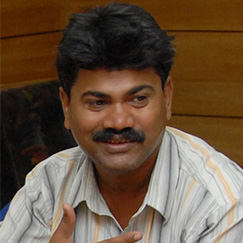Interviews
“My History”
Ramavarai Sah
Executive member of Association of People Affected by Leprosy (APAL)
India

A Message from “Little Flower”
I am Ramavarai Sah. This time, I live in Raxaul’s leprosy colony, named Little Flower.
In 1970, I was born in a village named Ramnagar, which is in West Champaran / Bihar. When I was just ten years old, I saw a patch on my body. This was the first one; then, slowly, slowly, I detected more patches all over my body; they were senseless. After some time, I got a blister in one of my left leg’s toes, it soon became my first ulcer.
It was in 1983. At that time I attended third class. I tried to hide the ulcer in my class, but I was impossible, all my classmates knew about it, soon. So, they started to build up a distance to me: no one talked to me or sat next to me, anymore. I was the topic in school and also in the village. One day, the principal called me, he took my schoolbooks back, as they were property of the school, and told me not to come back to school, again.
After some time, the head of the village called my father and instructed him to send me out of the village, he even threatened him that he would boycott my family, if my father did not obey. So, my father built a little hut, outside of the village, in the bank of the village’s river. There, I spent two years of my life. In the beginning, my family brought food, but after some time, they ignored me, as well, as my parents had to care for four more children, whom they wanted to settle in society. A connection with me would have been a problem for that. Consequently, I started to beg for my hungry tummy, this I had to do for two years.
One day, a leprosy-affected man came to my former village, where he was given some food to eat. Then, he looked for a place to sit down and eat. This is how he came to my hut. When he saw me, he knew immediately that I am too a leprosy-affected person. So, he asked me after the medicine I take. Until this moment, I had not been aware of any treatment or cure for leprosy. The man gave me the address of the leprosy colony Little Flower, where I reached the very next day, with my father. I was admitted in the leprosy hospital and my left leg’s toe was amputated. After some time, my father came to visit me in the hospital, when he saw my toes, he started to cry, and so did I.
After my recovery, I was afraid of returning to my lonesome hut and Little Flower’s founder, Baba Christa Das, allowed me to stay in the colony’s hostel. I easily adopted and found new friends, who were alike. For the first time, since I had leprosy, I was not discriminated. Several time later, I got to know my wife, who also lived in the hostel at that time. We got married in 1989 and the same year, my first son was born. The second son followed in 1991. Today, both of them get higher education in Delhi. And I work for my brothers and sisters, who still cry, like I used to do, before. I am engaged against the leprosy-connected discrimination and stigmatisation as well as for the human rights.